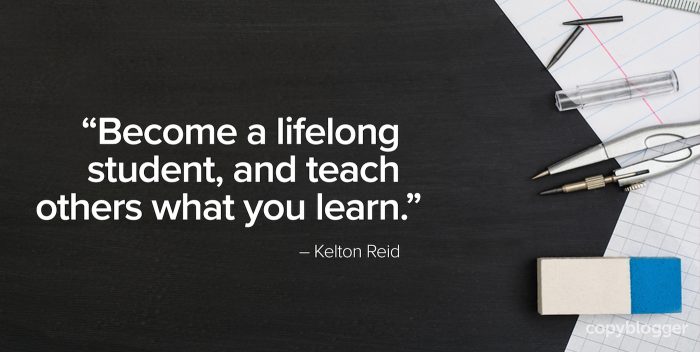You might want to take an extra sip of coffee before you read the next paragraph about content vs. content marketing.
We’re going to start with a brief geometry lesson, but I promise it will be gentle.
Squares are rectangles, but not all rectangles are squares. Similarly, content marketing is content, but not all content is content marketing.
In the past, I’ve referred to informative content as bland and boring, but those are just labels.
The crux of the matter is that creating strictly informative content will make you think content marketing doesn’t work.
I’m not splitting hairs
Both content and content marketing can aim to serve your target audience, but if you only create content, it’s not going to make a direct impact on your business.
Content may give someone the information they need, but it doesn’t help form a bond between a visitor and your website.
It may attract traffic, but that traffic doesn’t build a community.
Content marketing gives someone what they need and a reason to stick around.
Maybe they add a comment. Maybe they subscribe to your site because they like your outlook. Maybe they share your content to show that your worldview aligns with theirs.
Content marketing has long-term effects. It attracts traffic — then leads, then prospects, then customers — as you grow an audience who supports your offer.
Content marketing is not only more effective, it’s actually easier to produce
If content marketing helps you more than content, then it must be more difficult to produce, right?
I’m going to say No.
Here’s why.
Many people who already have everything they need to write effective content for their businesses limit themselves because they are preoccupied with first becoming an “expert.”
- They obsess over covering a topic from every angle, which leads to a sporadic publishing schedule.
- They try to please everyone with their tone to avoid criticism.
- They only write belabored, convoluted articles because they’re afraid shorter blog posts with focused points will look incomplete and discredit their authority.
Those three habits both make the creation process more difficult and lead to strictly informative content.
However, if the goal is content marketing, the writer’s intention shifts to serving their target audience.
- They want to help by publishing on a regular schedule.
- They choose who they want to attract and accept that trivial criticism from the wrong prospects is inevitable.
- They know that their point of view is more meaningful than trying to compete with an encyclopedia entry.
Content marketing is easier because you don’t have to know everything about your topic to get started.
The audience you’d like to nurture on a regular basis wants to hear your voice, not the same information they can find in mere content.
Let’s look at an example from songwriting.
In “Everything Is Broken,” Bob Dylan wrote:
“Seem like every time you stop and turn around
Something else just hit the ground.
Broken cutters, broken saws,
Broken buckles, broken laws,
Broken bodies, broken bones,
Broken voices on broken phones,
Take a deep breath, feel like you’re chokin’,
Everything is broken.”
He didn’t then go on to say, “Well, I mean not everything is broken. It’s important I point that out. There are some good things happening for me. You probably have some good things happening too. We’re all probably okay.”
That wouldn’t express a strong position. It wouldn’t empathize and connect with the person who is feeling like everything is broken. As a result, that wishy-washy song would be forgettable.
5 elements that transform content into content marketing
Now, content is actually a great starting place.
You need to have something useful to share with your audience, so it’s smart to care about creating a clear and complete presentation.
And once you weave in elements that make your content memorable, you activate its marketing power.
Whether you’re wondering about content vs. content marketing because you’re just getting started or you’re thinking about revamping your editorial strategy, see if these five qualities are a part of your content marketing mix:
- Perspective. Why do you care about your topic?
- Values. Are your beliefs apparent?
- Significance. What’s at stake?
- Community. How can someone join you?
- Offer. What’s the idea, product, or service you sell?
The art of content marketing transforms easy-to-come-by information into a special platform that enriches people’s lives over time.
Want to learn more about content marketing that works? Grab our free ebook for new writers below …




Reader Comments (17)
I like it Stefanie. It seems the difference between content and content marketing is clarity. If you get clear, you’ll be OK with critics, targeting specific readers and being short and punchy when need be. Fear not being clear. Folks comment how I tend to be bold with my writing. Is there another way? Be clear. Make your point. Write with conviction and clarity. Build a content marketing campaign.
Ryan
Clarity also leads to engagement and persuasion, which are the “marketing” parts of content marketing.
This is a clarifying article, Stefanie. Content Marketing builds relationships, it builds an audience.
One thing that holds me back is thinking I have to cover a unique, never before discussed topic. However, since the point of my content marketing is to build know/like/trust, just adding my own angle onto a topic is enough to make it unique
Absolutely. Almost none of us cover really new topics, but how you think about and talk about it is something that can stand out. (Plus, I bet someone who reads Copyblogger would also love to read what Hashim Warren had to say on the same themes and topics …).
Content is almost never zero-sum.
I think finding that angle — that also aligns with your audience’s worldview — is a more fun creative challenge than trying to find a completely new topic.
This really made me think about what I am doing on my own blog. As I read your post, I swear I saw a light bulb or two go on over my head! I am walking away with fresh ideas to bring to my own work! Thanks so much!
We love that, thanks for your note, Jane!
So happy to hear about those light bulbs!
Love this one, Stefanie!
You are so right with this. Content and content marketing are different.
I have been brainstorming on content marketing lately, and just content in general. I just had a great breakthrough right now – as I was reading your article here I’ve realized the powerful difference.
Sometimes we do forget to be ourselves and just speak with a genuine voice to the people we want to attract – and so concerned with the criticism we lose creativity. It has happened to me, and now I am finding my way back into the art of content and writing.
Thank you so much for sharing this! This was what I needed to improve my content creation skills! I can’t thank you enough, Stefanie, really!
Best regards!
Hi Stefanie,
Thanks for giving a clear idea about the difference between content and content marketing and changing my thinking that both are same.
This is really a very helpful article to improve content writing skills.
I think one thing that stops people from writing effective Content Marketing is that they don’t want to sound like salespeople. So, they stop at the Content part and never get to the Marketing part. And no, that doesn’t just mean tacking a Call To Action on at the end. It’s all about the mindset.
Also, love the Bob Dylan! I used to sing that when I repaired copy machines for a living. Every… single… day…
It does seem like a fitting song for the task!
Great observation about writers not wanting to sound like salespeople.
I like to think the best (most effective) salespeople don’t “sound like salespeople.” It goes back to art and creativity coming into play.
The real power is in the engagement! Nicely stated Stephanie.
I always thought I had to be neutral, and professional, etc. etc., and then I started putting my own opinions into blog posts and definitely saw the social shares go up. I even got invited onto a podcast because I was “clearly someone who doesn’t mind saying something controversial”. So I think the point about not trying to appeal to everyone is super important.
I love those examples of the results you get from making the change! I had the same experience.
I think the extent of the challenge depends upon what you are trying to sell. If it’s ball point pens or widgets, can one realistically expect to develop a relationship with customers over such a utilitarian product? You could do some creative ads but blogging about less-than-inspiring products is a real stretch.
What is or isn’t inspiring is a judgment. Professional writers view every topic as a creative challenge — whether it’s virtual reality or gym socks. Blogging is even more of an opportunity to connect when other content about a topic is dry because someone deemed it uninspiring.
This article's comments are closed.